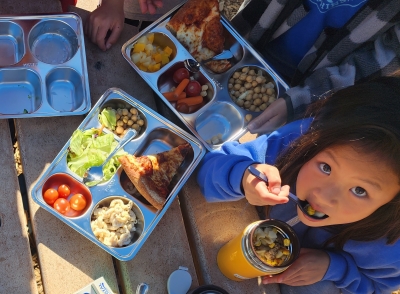Reusable Foodware Cafeteria Grants
Application Deadline: February 24, 2025
These grants are for innovative projects to replace single-use disposable foodware with reusable systems in closed-environment* cafeterias and similar dining facilities in Alameda County. These locations offer ideal conditions for piloting reusable foodware systems due to their controlled operations and typically high volume of meals served.
*Closed-environment dining facilities are those that exclusively use reusable foodware—such as plates, bowls, utensils, and cups—for on-site dining. After use, the foodware is collected, cleaned, and returned for continuous reuse. Facilities offering take-out or "grab-and-go" options are not considered closed environments for the purposes of these grants.
Eligible closed-environment* locations include
-
K-12 Schools: Dining areas in public and private schools.
-
Colleges and Universities: Dining facilities in higher education institutions.
-
Corporate Campuses: On-site cafeterias serving employees.
-
Hospitals and Healthcare Institutions: Dine-in food service operations within medical facilities.
-
Other Large Institutions: Any organization with a closed-environment, cafeteria-style dining facility.
Who can apply
- School districts, public and private schools, nonprofits, businesses, and institutions.
- Reusable foodware vendors and service providers. (Must identify a specific project and location to implement reusable foodware, name key contact/players, and provide letters of support).
-
Current StopWaste grantees with open contracts are not eligible to apply for the Equipment Grants.
Eligible projects must
- Replace disposable foodware with reusable solutions.
- Take place in closed-environment cafeterias or similar dining facilities serving at least 150 meals per day. (For lower volume, please contact us at swgrants@stopwaste.org before applying).
- Align with Reusable Cafeteria Grant Priorities.
- Projects must take place in Alameda County.
Examples of eligible funding requests
-
Reusable foodware to replace disposables.
-
New dishwashing equipment or upgrades to existing equipment.
-
Milk dispensers and reusable cups to replace disposable milk cartons.
-
Bulk condiment dispensers to replace single-serve packets.
-
Contract agreements with outside dishwashing services to pick up, wash and redistribute the dishware.
-
And more! We are looking for innovative ideas.
-
Explore project highlights from previous grantees for examples of eligible projects and access resources to help you envision and plan a reusable foodware system for your facility.
Non-eligible funding requests
- Projects replacing disposables with reusables at restaurants, cafés, or in retail food courts and markets are not eligible for funding. For these, refer to our Reusable Foodware Mini-Grants.
- Open-system reusable foodware projects, where reusable containers are taken off-site and returned later (e.g., take-out, to-go or “grab and go” settings) are not eligible.
- Projects focusing on recycling or composting foodware are not eligible for funding.
Funding amounts
- Proposals ranging from $25,000 to $50,000 will be considered.
- A total of $200,000 is available for this grant cycle.
- If funds remain after grant awards are announced, we will schedule another round of grant solicitations.
Grant application timeline
-
Application Deadline: February 24, 2025
-
Grant Awards Announced (anticipated): April 18, 2025
-
Note: If funds remain, applications continue to be accepted on a rolling basis.
Application support available
StopWaste strongly encourages applicants to contact us to discuss their proposed project before submitting an application. We offer valuable resources, including equipment and vendor recommendations, cost estimates, logistical guidance for reusable foodware implementation, and hands-on assistance during rollout. This support is available both before grant applications are submitted and during the implementation of awarded grant projects.
Engaging with StopWaste early in the process increases the likelihood of receiving funding. To request support, please reach out to Reusable Foodware Grant Manager at swgrants@stopwaste.org.
Grantee Highlights
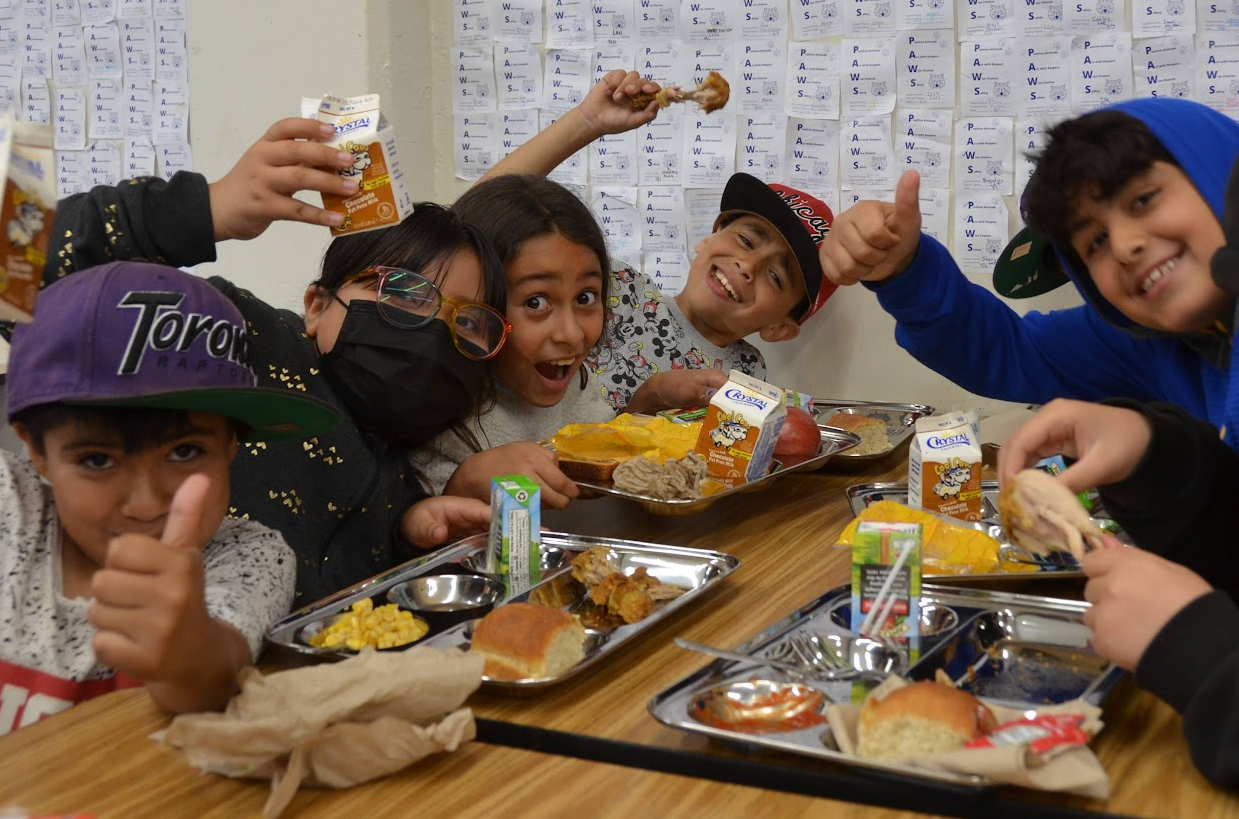
Fremont Unified School District (FUSD)
Ten of FUSD’s 29 K-5 schools switched from compostable paper trays, “spork kits” (plastic spork, plastic straw and paper napkin sealed in plastic baggie) and single-serve condiment packets to reusable stainless-steel trays, forks and spoons, as well as napkin dispensers and bulk condiment pumps. After each meal period, Dishjoy, a third-party dishwashing service, collects the used trays and utensils to wash offsite, then redistributes them to each school. FUSD rolled out the program in two phases, using several funding sources including a $50,000 grant from StopWaste. They are preventing 2,373,300 single-use items each year and looking to expand to more schools in the District.
Berkeley Unified School District (BUSD)
BUSD used a $25,000 grant from StopWaste to convert six elementary and middle schools from disposable foodware to reusable, stainless-steel trays, cups, bowls and sporks. They expect to prevent 584,280 single-use foodware items each year. The conversion also included the purchase and installation of a dishwashing machine in each of the schools to wash the reusable foodware items. Although the project required a small increase in labor expenses, the avoided purchase of disposable foodware and reduced cost for garbage collection is anticipated to result in a net savings of $18,262 annually.
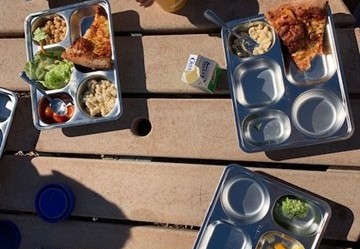
Albany Unified School District (AUSD)
AUSD used a StopWaste grant to replace disposable foodware with reusable, stainless-steel trays, cups and utensils at three elementary schools, which is expected to prevent 594,000 disposable foodware items each year. Grant funding also helped AUSD purchase a dishwashing machine and install it at their central kitchen. Staff shuttles dishes between participating sites and the washing station in a district-owned van.
Resources
These resources can help you envision and plan a reusable foodware system for your facility.
Ditching Disposables Toolkit
The Center for Environmental Health (CEH) created this online toolkit to support schools in transitioning away from single-use foodware. Drawing on CEH's hands-on experience implementing reusable systems at a number of school sites, the toolkit offers practical guidance and proven best practices.
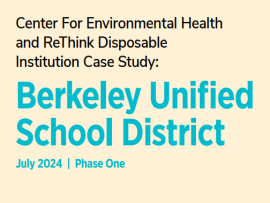
Berkeley Unified School District Case Study
Berkeley Unified School District is working to transition the entire district to reusable foodware. This case study highlights Phase 1 of their initiative, focusing on the successful transition of three schools to reusables.
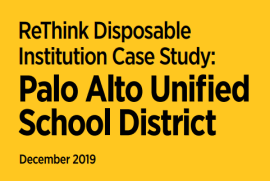
Palo Alto Unified School
Palo Alto Unified School District implemented reusable foodware in all 12 of its elementary schools, achieving annual savings of $25,000.
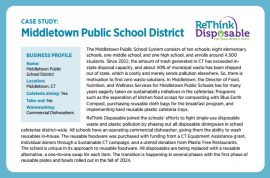
Middletown Public School District
ReThink Disposable collaborated with the Middletown Public School District in Connecticut to eliminate disposable foodware across all school cafeterias. This shift is projected to save the district over $120,000 in avoided purchasing costs.
Reusable Cafeteria Grant Selection Priorities
Funding for Alameda County-based, closed-environment projects will be allocated in the following order of priority:
1. K-12 Schools |
|
2. Multi-Building Campuses and Large Institutions |
|
3. New StopWaste Grantees |
|
4. Project Location |
|
